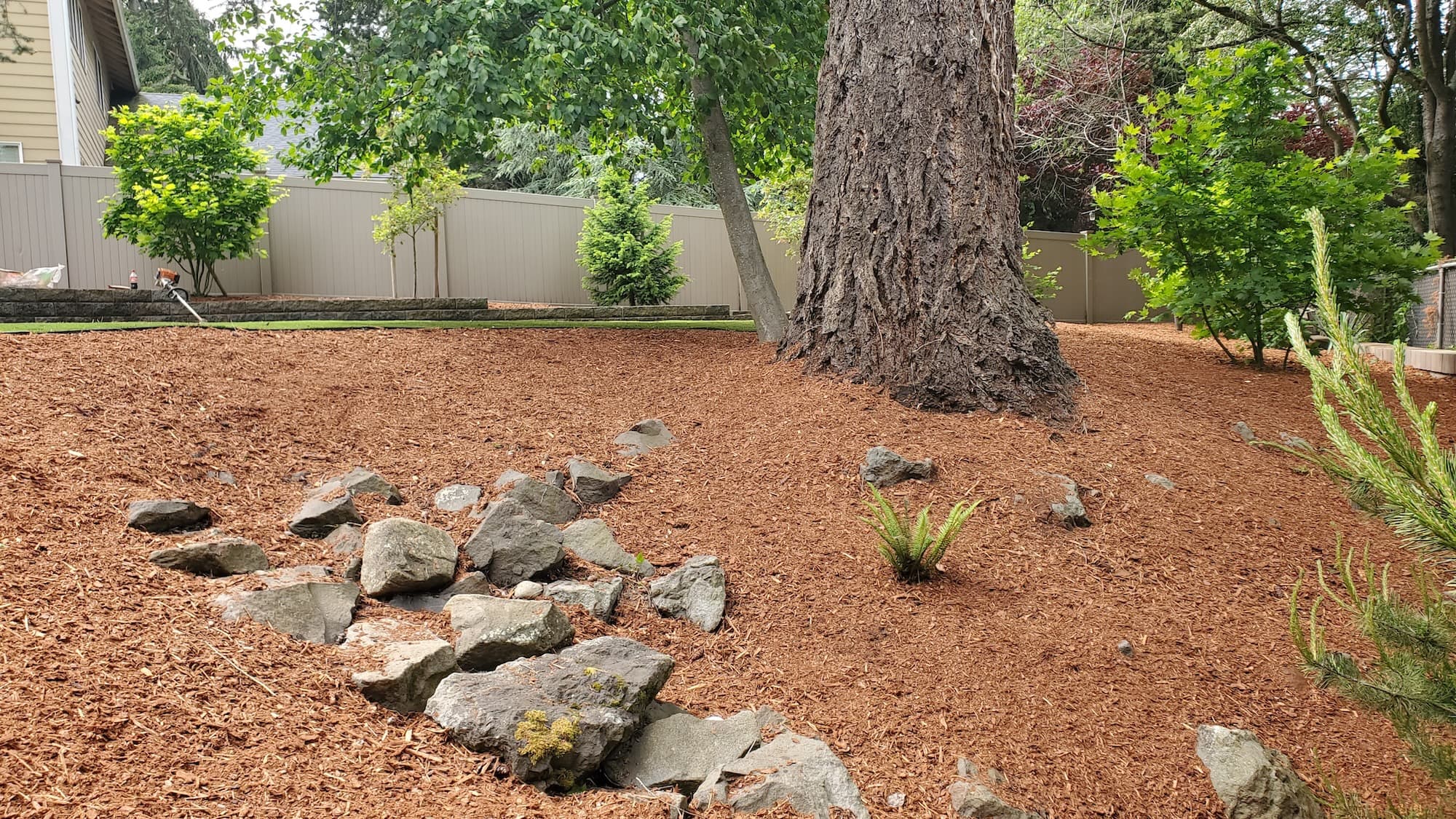West Seattle Brown dyed mulch installation
Homeowner’s Issue
West Seattle yards face a specific set of challenges: heavy winter rains, pockets of compacted glacial till, steep driveways and terraces, and widespread shade from mature cedars and maples. Many properties near Alki, Admiral, and Lincoln Park sit on slopes or filled lots where surface runoff and erosion are routine problems. Shallow, peaty patches hold water in low spots while raised beds dry fast in summer sun; that patchwork makes consistent planting and moisture management difficult.
Weed pressure here is seasonal but persistent — moss and clover thrive in cool, damp shade; grass and dandelions push up through thin mulch layers; Himalayan blackberry edges invade neglected borders. Homeowners also juggle curb-appeal rules from HOAs and city sightline requirements for street trees and stormwater flow. Given Seattle’s long wet season and concentrated summer drying, a properly installed 2–3” mulch layer of responsibly sourced, brown-dyed wood conserves moisture, buffers soil temps, and suppresses light-hungry weeds while keeping paths safe. We use no herbicides: sustainable, mechanical prep and organic surface treatments are standard. Expect better plant health, less monthly maintenance, and a tidy look that holds through West Seattle’s wet shoulder seasons.
Our Quality Service
- We remove old mulch, hand-pull invasive runners, and mechanically decompact soil where needed.
- We use screened, recycled-wood brown-dyed mulch at 2–3” depth, applied with wheelbarrows and blower systems for even coverage.
- Tools: pruning saws, steel rakes, tamping bars for edging, and biodegradable weed-suppressing fabric when requested.
- Timeline: most standard yards complete in a half- to full-day; larger or sloped jobs may take 1–2 days with a two-person crew.
- Local insight: we grade for surface drainage, feather mulch off sidewalks to meet sightline rules, and avoid piling near trunks to prevent crown rot.
- Sustainability: no herbicides, compost-amendments option, and green-bin or haul-away disposal for old material.
Benefits: reduced erosion on slopes, less hand-weeding, improved curb appeal, healthier soil moisture retention, and long-lasting color that fits West Seattle streetscapes.
What’s Included
- Site prep: remove old mulch, surface weeds, and light debris.
- Soil check: assess compaction, grade, and drainage; recommend amendments if needed.
- Mulch application: 2–3 inches of brown-dyed recycled wood mulch, even spread.
- Edging: define beds and clean hardscape lines.
- Cleanup: broom, blow, and tidy walkways.
Options / upgrades:
- Mulch + biodegradable landscape fabric (for heavy weed pressure).
- Organic weed control: vinegar-based spot treatments and hand removal.
- Compost/topsoil amendment for planting beds.
- Haul-away (to licensed facility) vs. curbside green-bin placement.
- Planting touch-ups or seasonal color additions.
Before & After / Expectations
- Mess & noise: expect wood dust, truck and wheelbarrow traffic, and short-term noise during the work window.
- Access: driveway or street parking within 50 feet preferred; we’ll flag utilities and keep clear paths.
- Debris: we separate green waste and old mulch; choose green-bin drop or haul-away.
- Timelines: prep + install typically same day for average yards; steep or terraced properties may need an extra day.
- Aftercare in West Seattle: maintain 1” of supplemental mulch in late summer if high foot traffic; avoid adding mulch directly against tree trunks; monitor moss-prone shady beds in spring and scrape a thin top layer if moss reappears.
- Watering windows: mulch reduces watering needs; irrigate new plantings early morning during dry spells (June–September) and avoid evening watering that encourages moss.
FAQs
Q: How long will the brown color last?
A: Color holds 8–18 months depending on sun exposure; shaded beds retain color longer. We use quality recycled wood dyes that fade evenly.
Q: Will mulch attract pests in West Seattle’s climate?
A: Proper depth (2–3”) and keeping mulch away from foundations/structures minimizes pest shelter. We don’t use herbicides or pesticides; we recommend inspection and mechanical control if pests appear.
Q: Do you use herbicides to prep beds?
A: No. We use mechanical removal, hand-pulling, and organic spot treatments only.
Q: How do you handle steep slopes or terraces?
A: We bench or stake mulch in high-erosion zones, recommend coir logs or native-plant anchors, and may add biodegradable fabric under mulch on very steep faces.
Q: What about HOA rules or sightlines?
A: We follow local sightline and street-tree clearances and will flag any HOA-related concerns during the estimate.
Call to Action
Ready to tidy a West Seattle yard that withstands rain, slope, and shade? Book a free estimate for an honest plan and timeline. Quick scheduling for Admiral, Alki, Lincoln Park, and surrounding neighborhoods. Trusted local crews, sustainable methods, and clear pricing.
Email: neatandtidyseattle@gmail.com
Phone: 206-538-9344
Mon–Sun: 9am–6pm
We’ll provide a photo-based quote or an on-site visit and a simple maintenance plan to keep your beds tidy season-round.










